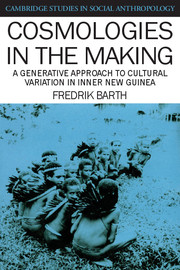Book contents
- Frontmatter
- Contents
- Foreword by Jack Goody
- Map: Major territories of the mountain Ok
- 1 The problem
- 2 An attempt at systematic comparison: descent and ideas of conception
- 3 The possible interrelations of sub-traditions: reading sequence from distribution
- 4 The context for events of change
- 5 The results of process – variations in connotation
- 6 Secret thoughts and shared understandings
- 7 The stepwise articulation of a vision
- 8 Experience and concept formation
- 9 The insights pursued by Ok thinkers
- 10 General and comparative perspectives
- 11 Some reflections on theory and method
- Bibliography
- Index
- Cambridge Studies in Social Anthropology
10 - General and comparative perspectives
Published online by Cambridge University Press: 05 June 2012
- Frontmatter
- Contents
- Foreword by Jack Goody
- Map: Major territories of the mountain Ok
- 1 The problem
- 2 An attempt at systematic comparison: descent and ideas of conception
- 3 The possible interrelations of sub-traditions: reading sequence from distribution
- 4 The context for events of change
- 5 The results of process – variations in connotation
- 6 Secret thoughts and shared understandings
- 7 The stepwise articulation of a vision
- 8 Experience and concept formation
- 9 The insights pursued by Ok thinkers
- 10 General and comparative perspectives
- 11 Some reflections on theory and method
- Bibliography
- Index
- Cambridge Studies in Social Anthropology
Summary
The various cosmological visions that we have been discussing compose a major part of the spiritual tradition of a materially simple neolithic society. It is not altogether straightforward to discern the presence of such a tradition, lacking as it is in the physical signposts around which civilizations organize their comparable systems of knowledge: the stately architecture, the fulltime specialists, the political luminaries they serve, the esoteric archives they maintain. In a rather similar situation among the Ndembu, Turner observed:
Gradually I became aware of a vast and complicated system of ceremonial practices going on around me somewhat as one picks out the skyline of a distant city in the growing dawn. It was an astonishing and enriching experience to note the contrast between the relatively simple and monotonous economic and domestic life of these hunters and hoe cultivators and the ordered arrangement and colourful symbolism of their religious life.
(Turner 1967: 2).The Ndembu, indeed, compose a population and occupy a territory roughly comparable in size to the sector of the Mountain Ok covered in the preceding discussion, and are in many ways also comparable in the profusion and force of their ritual life. Yet clearly, in major respects the two traditions differ, not only because the cultural contents they transmit are historically unrelated, but also because the traditions of knowledge are differently constituted.
- Type
- Chapter
- Information
- Cosmologies in the MakingA Generative Approach to Cultural Variation in Inner New Guinea, pp. 74 - 82Publisher: Cambridge University PressPrint publication year: 1987



